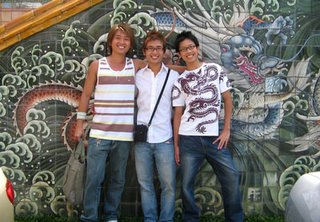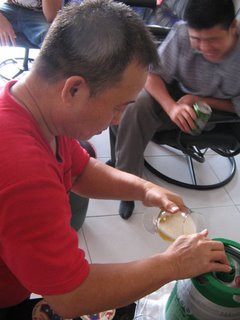Growing Up
5 days into a new year.
6 months to go before you turn 25.
How do you know you've grown a little older?
You start with the filing.
Boys, worry about toys.
Bosses, worry about their business.
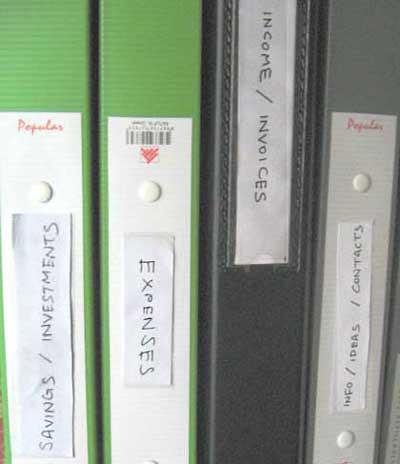
I try to convince myself that I am not that young, naive chap anymore.
In the past, I only had two files. They had no labels on the outside, only mental notes. The grey file had "important personal document thingies " like CPF statements, NS documents etc. The other, in black, held my freelance invoices, payslips, project contracts and other business related paperishizzi.
I was especially sloppy with the way I handled my finances in the past because...well, I didn't exactly have much finances to handle!
$10.31Yea, go ahead and create a "Savings / Investments" folder when that is all you have in your bank account.
But times are different now. I have enjoyed...*whisper* a short period of rewarding employment (you can't holler about these things or you'll scare all the good-luck charmies away).
So, anyway, with professional success, comes files and folders!
Yes, I can finally afford nice-looking files. (Isn't that amazing?)
But I'm still scrimping on labels, so recycled pieces of paper with hasty scrawls and cheap double-sided tape will suffice.
The thing about being a freelancer is that you never know when a well-paying project will come in, or when a series of lucrative deals will dry up. You can pitch and plough but the harvest will almost always be elusive.
So what can you do to sustain your financial, professional and personal freedom?
(The main reasons you became a freelancer in the first place)
What can you do to rein in your consumerist excesses?
How can you attain that dream of being a carefree car-owner on an island with C.O.E & E.R.P?
How will you be able to start a family and afford those trips with the queen/princes/princesses to Japan for miso soup?
The answer:
Filing!
Filing? (Not Fling lah!)
Filing.
Yes!
Filing!
(no, lah, put your fingernails away lah, KNNBCCB).
Files and Folders.
Organize your chaos. And then convince your slothful inner twin to listen to the other one with more discipline and drive.
When you are a young, irresponsible freelancer with a healthy dose of disrespect for many things, it is easy to say "Screw it!" when faced with the need for personal discipline in the realm of professional/financial self-organization.
It is tempting for Mr. young, irresponsible freelancer to toss the paperwork somewhere within the vicinity of his desk, and proceed to do something infinitely more entertaining. Very, very tempting.
BUT,
HOW LONG CAN YOU LIVE LIKE THIS??????
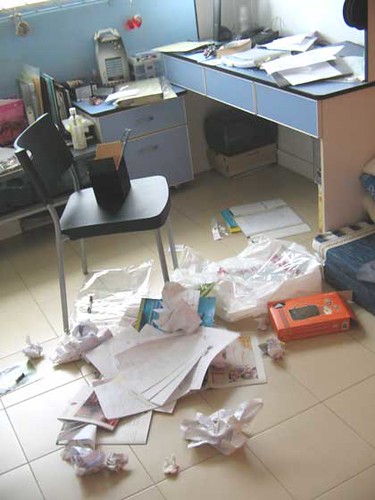
Postmodernist living (i.e. bochup like crazy)
Now, don't worry. In addition to filing, I also cleaned up my room this afternoon.
A clean and neat room, indeed, has a calming cosmic energy

So let us ask that question again:
How do you know you've grown a little older?
You blog about growing old, and filing,
in your very clean room.
Wo Lau liao!
Hope. And Live.
If you're reading this,
you've gotten out.
And if you've come this far,
maybe you're willing
to come a little further.
Re-read.
2nd Jan, 11.08am, 2006.
----------------------------------------------------------------
292 EXT -- HAYFIELD -- DAY 292
Red walks the long rock wall, nearing the tree. A squirrel
scolds him from a low branch, scurries up higher. Red studies
the base of the wall. Nothing unusual here. Just a bunch of
rocks set in stone. He sighs. Fool's errand. Turns to go.
Something catches his eye. He walks back, squats, peering
closer. Wets a fingertip and rubs a stone. A layer of dust comes
off. Volcanic glass. Gleaming black. He tries to get the rock
out, anticipation growing. It won't come; it's too smooth. He
pulls a pocketknife and levers the rock free. It tumbles at his
feet, leaving a ragged hole.
Red leans down and solves the mystery at last, staring at the
object buried under the rock. Stunned. It's an envelope wrapped
in plastic. Written on it is a single word: "Red."
Red pulls the envelope out and rises. He just stares at it for
a while, almost afraid to open it. But open it he does. Inside
is a smaller envelope and a letter. Red begins to read:
ANDY (V.O.)
Dear Red. If you're reading this,
you've gotten out. And if you've
come this far, maybe you're willing
to come a little further. You
remember the name of the town,
don't you? I could use a good man
to help me get my project on
wheels. I'll keep an eye out for
you and the chessboard ready.
(beat)
Remember, Red. Hope is a good
thing, maybe the best of things,
and no good thing ever dies. I will
be hoping that this letter finds
you, and finds you well. Your
friend. Andy.
By now, tears are spilling silently down Red's cheeks. He
opens the other envelope and fans out a stack of new fifty-
dollar bills. Twenty of them. A thousand dollars.
293 INT -- RED'S ROOM -- DAY (1967) 293
Red is dressed in his suit. He finishes knotting his tie, puts
his hat on. His bag is by the door. He takes one last look
around. Only one thing left to do. He pulls a wooden chair to
the center of the room and gazes up at the ceiling beam.
RED (V.O.)
Get busy living or get busy dying.
That is goddamn right.
He steps up on the chair. It wobbles under his weight.
294 INT -- BREWSTER -- RED'S DOOR -- DAY (1967) 294
The door opens. Red exits with his bag and heads down the
stairs, leaving the door open. CAMERA PUSHES through, BOOMING
UP to the ceiling beam which reads: "Brooks Hatlen was here."
A new message has been carved alongside the old: "So was Red."
295 INT -- GREYHOUND BUS STATION -- DAY (1967) 295
TRACKING SHOT reveals a long line of people at the counter.
RED (V.O.)
For the second time in my life, I
am guilty of committing a crime.
CAMERA brings us to Red, next in line, bag by his feet.
RED (V.O.)
Parole violation. I doubt they'll
toss up any roadblocks for that.
Not for an old crook like me.
RED
(steps up)
McNary, Texas?
296 EXT -- TRAVELING SHOT -- DAY (1967) 296
A gorgeous New England landscape whizzes by, fields and trees
a blur of motion. ANGLE SHIFTS to reveal a Greyhound Sceni-
Cruiser barreling up the road, pulling abreast of us. CAMERA
TRAVELS from window to window, passing faces. We finally come
to Red gazing out at the passing landscape.
RED (V.O.)
I find I am so excited I can barely
sit still or hold a thought in my
head. I think it is the excitement
only a free man can feel, a free
man at the start of a long journey
whose conclusion is uncertain...
297 THE BUS 297
ROARS past camera, dwindling to a mere speck on the horizon.
RED (V.O.)
I hope I can make it across the
border. I hope to see my friend
and shake his hand. I hope the
Pacific is as blue as it has been
in my dreams.
(beat)
I hope.
__________________________
Frank Darabont was here.
__________________________
Goodbye 2005
This new year's eve, I emceed for Singapore's Largest Volunteers' Fair :
Countdown to 2006 @ The Giving Tree.

Yea, I look absolutely fab with my glowing tan and my bright smile, don't I?
And Yea, I'm the only one in the pictures not wearing any......

not wearing any....
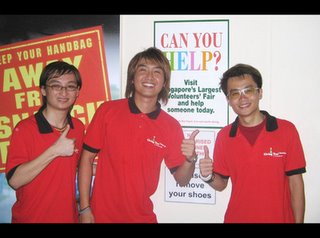
not wearing any....
Glasses.
----------------------------------------------
Have a beautiful 2006!
-----------------------------------------------



